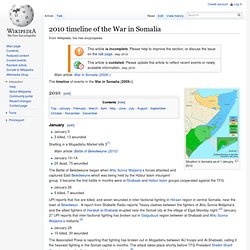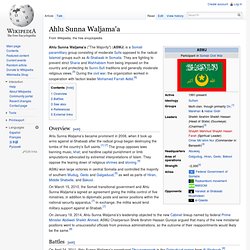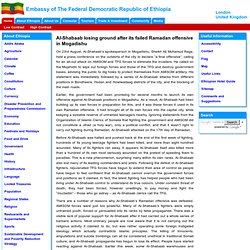

2010 timeline of the War in Somalia. The timeline of events in the War in Somalia (2009–).

Situation in Somalia as of 1 January 2010 2010[edit] January[edit] January 53 killed, 13 wounded Shelling in a Mogadishu Market kills 3[1] January 10–1425 dead, 75 wounded January 265 killed, 7 wounded UPI reports that five are killed, and seven wounded in inter-factional fighting in Hiiraan region in central Somalia, near the town of Beledweyn . January 2915 killed, 30 wounded The Associated Press is reporting that fighting has broken out in Mogadishu between AU troops and Al-Shabaab, calling it the heaviest fighting in the Somali capital in months. February[edit] February 89 killed, 14 wounded At least nine people have been killed and 14 others wounded in heavy shelling in Somalia's capital, Mogadishu, according to a human rights group. February 1130 killed Islamists attempted to pre-emptively strike the TFG before the beginning of a major TFG offensive.
May[edit] Somalia. Somalia’s government achieves improvement in Mogadishu. During the last month the military situation throughout southern Somalia has remained stagnant on a certain level, but within the city of Mogadishu certain changes have occurred. The government has dealt with internal problems and formed alliances with important partners in their struggle against Al Shabaab forces. As a result of this the Transitional Federal Government has been able to perform better than before on the streets of Mogadishu. New promises of a strengthened African Union mission in Somalia as well as its willingness to support the TFG in offensive operations in northern Mogadishu also deliver some possibilities to the government of Somalia.
Summary After the Al Shabaab had taken control of Bondheere and Shibis districts of Mogadishu the TFG was unable to immediately respond. Weeks ago the Al Shabaab rebels had control over the Bondheere and Shibis districts of Mogadishu. On a political level the Transitional Federal Government did encounter problems at this point in time.
Ahlu Sunna Waljama'a. Overview[edit] Ahlu Sunna Waljama'a became prominent in 2008, when it took up arms against al-Shabaab after the radical group began destroying the tombs of the country's Sufi saints.[1] [7] The group opposes laws banning music, khat; and hardline capital punishment or limb amputations advocated by extremist interpretations of Islam.

They oppose the tearing down of religious shrines and stoning.[4] ASWJ won large victories in central Somalia and controlled the majority of southern Mudug, Gedo and Galgaduud,[5] as well as parts of Hiran, Middle Shebelle, and Bakool. On March 15, 2010, the Somali transitional government and Ahlu Sunna Waljama'a signed an agreement giving the militia control of five ministries, in addition to diplomatic posts and senior positions within the national security apparatus.[7] In exchange, the militia would lend military support against al-Shabab.[7] Battles[edit] See also[edit] References[edit] External links[edit] Official Website (Somali) Embassy of The Federal Democratic Republic of Ethiopia. On 23rd August, Al-Shabaab’s spokesperson in Mogadishu, Sheikh Ali Mohamud Rage, held a press conference on the outskirts of the city to declare “a final offensive”, calling for an all-out attack on AMISOM and TFG forces to eliminate the invaders.

He called on the Mujahidin to wipe out foreign forces and those of the TFG and destroy government bases, advising the public to dig holes to protect themselves from AMISOM artillery. His statement was immediately followed by a series of Al-Shabaab attacks from different positions in Bondheere, Hodan and Howlwadaag districts of the city, and the blocking of the main roads. Earlier, the government had been promising for several months to launch its own offensive against Al-Shabaab positions in Mogadishu. As a result, Al-Shabaab had been building up its own forces in preparation for this, and it was these forces it used in its own Ramadan offensive. There are a number of reasons why Al-Shabaab’s Ramadan offensive was defeated.